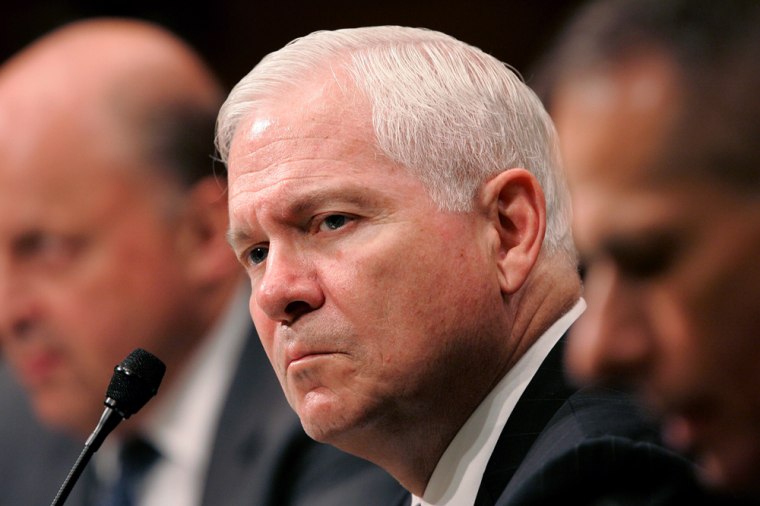Outlining for the first time his concern about private contractors in Iraq, Defense Secretary Robert Gates told Congress on Wednesday that he sent a fact-finding team to Baghdad and has reminded U.S. commanders that they have the authority to discipline contractors.
Gates also said he was troubled by security contractors’ practice of luring soldiers out of uniform by offering them higher salaries. He said he was looking for ways to put legal limits on that practice.
In remarks to the Senate Appropriations Committee, Gates said he understood the reason for having 137,000 private contractors in Iraq — their presence allows U.S. troops to focus on combat while simpler tasks like providing food and laundry services and guarding fixed sites are done by private hires.
“But we clearly have to have proper oversight procedures and oversight activities in place to make sure they’re doing what they’re supposed to,” he said, adding: “My concern is whether there has been sufficient accountability and oversight.”
Blackwater incident sparks probe
Gates appeared before the committee to spell out the administration’s request for nearly $190 billion in new funding for the wars in Iraq and Afghanistan. But the discussion quickly turned to the issue of private security contractors in Iraq, some of whom have been accused of rogue behavior.
Gates said he began probing the military’s relationship with its contractors after 11 Iraqis were killed Sept. 16 in a shooting involving Blackwater contractors protecting a U.S. diplomatic convoy in Baghdad. The Blackwater employees in that case were working for the State Department.
Secretary of State Condoleezza Rice last week ordered a review of State Department security in Iraq, including an examination of the rules governing security contractor actions. A joint U.S.-Iraqi commission is also beginning to look at widely conflicting accounts of the Sept. 16 incident.
Speaking at the Pentagon before Gates’ appearance on Capitol Hill, his press secretary, Geoff Morrell, said Gates has received some preliminary answers to his initial questions about contracting in Iraq.
“Those answers, at least when it comes to the oversight component, have not been satisfactory,” Morrell said. “He has some real concerns about oversight of contractors in Iraq and he is looking for ways to sort of make sure we do a better job on that front.”
Gates said the Pentagon has sufficient legal authority to control its contractors. The issue, he said, is whether commanders have sufficient “means and resources” to exercise adequate oversight.
Use of code of justice considered
The Pentagon also disclosed Wednesday that for several months it has been developing additional guidance for American commanders and other senior defense officials on how the Uniform Code of Military Justice can be used to discipline contractors. Prior to October 2006, the code did not apply to contractors.
There are about 7,300 private security contractors working for the Pentagon in Iraq, of which about 5,000 are guarding fixed sites of importance to the U.S. military or the Iraqi government, according to Pentagon figures. The contractors are immune from Iraqi law, and none has been prosecuted under the Uniform Code of Military Justice, according to Morrell.
Critics have cautioned for years that the Pentagon was counting too heavily on private security contractors.
“Many outsiders have predicted since the war began that the reliance on contractors — especially security contractors — was going to eventually produce problems, and now it has,” said Loren Thompson, a defense expert at the Lexington Institute, a think tank.
“The nature of the war does not encourage anybody to pay close attention to what local laws require,” he said. “When you’re in an environment where the Shiite militias and the Sunni insurgents are paying no attention at all to the law, there’s always a rationalization for American forces ignoring it, too, and that’s doubly true in the case of private contractors.”
Security firms lure soldiers with higher pay
In his Senate testimony, Gates raised a separate contractor-related problem for the military.
“My personal concern about some of these security contracts is that I worry that sometimes the salaries they are able to pay in fact lures some of our soldiers out of the service to go to work for them,” he said.
Gates said he was seeking legal advice on whether a “non-compete” clause could be put into security contracts that limits this problem.
To obtain a clearer picture of the U.S. military’s relationship with its contractors, Gates sent a five-person team to Iraq on Sunday to “talk to all the key players,” including Gen. David Petraeus and Lt. Gen. Ray Odierno — the top two U.S. commanders there, Morrell said. They are to return by the end of the week.
Also, Deputy Defense Secretary Gordon England issued a memorandum to commanders on Tuesday spelling out what authority they already have to ensure that private contractors comply with U.S. rules, Morrell said.
The memo tells the commanders that they have the authority to ensure that all security contractors are authorized and trained to carry weapons and that none has unauthorized weapons or ammunition, he added.
The memo alluded to the Sept. 16 Blackwater incident without mentioning the contractor by name and said that the shooting of civilians “identified a need to better ensure” that Pentagon policies are being followed by its contractors.
